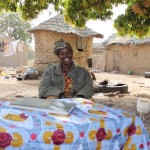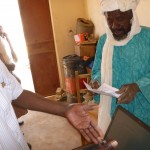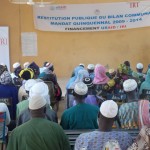In the south of Mali, members of the Fanidiama village community gather under a large tree to learn about the benefits of exclusive breastfeeding.

Rice growing is a tradition in Mali that dates back more than 1,000 years. Kalia Koné from Kongolikoro village in the Sikasso region in southern Mali has been growing rice for more than 15 years. But traditional rice planting practices were not resulting in good yields.

Internal conflict left the town of Menaka in northern Mali occupied by a succession of rebel groups for three years. It also left them without electricity.
The citizens of Timbuktu, a region in northern Mali, experienced a large number of abuses during the country’s 2012 conflict, including rape and assault. Now victims of human rights abuses are attending psychosocial counseling as they move along the path to recovery.

For decades, elected officials in Mali would finish their terms without accounting for their actions to their constituents. Following the 2012 political crisis in Mali, the citizenry, elected officials and civil society recognized that this had to change.








Comment
Make a general inquiry or suggest an improvement.